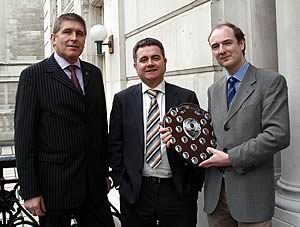 |
|||||||||
|
|||||||||||||||||||
|
|
Simon Foster Wins Barrie Orme Trophy Simon Foster from Syngenta Bioline has won a top national award recognising his technical ability and professionalism in crop protection.
He received the Barrie Orme trophy from Dominic Dyer, Chief Executive of the Crop Protection Association, at a ceremony held at the Farmers Club in London. Now in its tenth year, the prize is awarded annually to the best candidate in the UK’s top crop protection qualification, the BASIS Certificate in Crop Protection. There were 186 successful candidates in 2010. Accepting the award Simon said, “I found the whole experience very worthwhile and I hope to be an ambassador for the industry, integrating cutting edge biological products with the most up-to-date chemistry into ICM (Integrated Crop Management) programmes.” As well as the trophy, he received vouchers for travel to London, accommodation for two nights for two people with theatre tickets and £150 spending money. In 1998, after completing a BSc degree in Environmental Biology, Simon joined Syngenta Bioline as a Production Technician. Syngenta Bioline is based in Little Clacton, Essex where it breeds a range of beneficial insects and mites and sells these to control the insect pests that can infest protected crops such as cucumbers, tomatoes and flowers. In 2005 at Quality Manager Simon began working more closely with growers and their technical advisers. Strictly he did not need to take this exam, which is often known as ‘the Advisers’ Certificate’ since legally it must be held by anyone who sells and supplies crop protection products. However as Simon explains: “Whilst I was not expected to provide advice I did find that customers often asked about which chemicals could be used with the biological products we supply so it made a lot of sense for me to get the certificate.” Since qualifying last summer, Simon has been promoted to Technical Manger and is now deeply involved in the development of new products, formulations and delivery systems. The BASIS qualification is a tough test. The assessment involves a written project, Simon’s was on Sciarid fly control in Poinsettias, a written exam, a practical identification test and one-to-one questioning in the field from each of three examiners. “The training I received from David Godsmark and the Swallowfield team was excellent. David has this infectious enthusiasm that made even the tricky topics interesting. The visits to nurseries and time spent scrutinising a pesticide store was extremely valuable,” he says. “The BASIS certificate is not a pesticides exam; it’s about understanding how best to manage crop pests and diseases in a safe, responsible, efficient and sustainable way. This means integrating any number of different practices, technologies and plant protection products to protect crop yield and quality. In many horticultural crops, particularly covered crops, the use of beneficial organisms in conjunction with plant protection chemicals and cultural practices is now standard. For the future I can see the next ten years being particularly exciting with new ways of combining the ever growing armoury of beneficial organisms with the most up-to-date chemical pesticides to produce more effective pest and disease control,” he concludes. Runners-up were Kent farmer William Cyster, Agrovista’s Ashpal Bachoo, an agronomist in Hampshire/Wiltshire, and Robert Jackson, trials coordinator for the British Society of Plant Breeders in Ely. The award is sponsored by the Agricultural Industries Confederation, Nufarm UK Ltd and C & J Supplies.
|
||||||||||||||||||

|
|
||||||||||||||||||
| home | agri-services | pedigree
pen | news | dairy | beef | machinery BPS | property | organisations | site map |
|||||||||||||||||||


